
2 janvier 2025
MAFR TV : MAFR TV - Surplomb

🌐suivre Marie-Anne Frison-Roche sur LinkedIn
🌐s'abonner à la Newsletter MAFR. Regulation, Compliance, Law
🌐s'abonner à la Newsletter Surplomb, par MAFR
____
► Référence complète : M.-A. Frison-Roche, "La poursuite de l’institutionnalisation de l’Europe de la Compliance : création par le règlement du 31 mai 2024 de l’Autorité européenne de lutte contre le blanchiment d’argent et le financement du terrorisme (AMLA)", in série de vidéos Surplomb, 2 janvier 2025
____
🌐visionner sur LinkedIn cette vidéo de la série Surplomb
____
____
🎬visionner ci-dessous cette vidéo de la série Surplomb⤵️
____
Surplomb, par mafr
la série de vidéos dédiée à la Régulation, la Compliance et la Vigilance
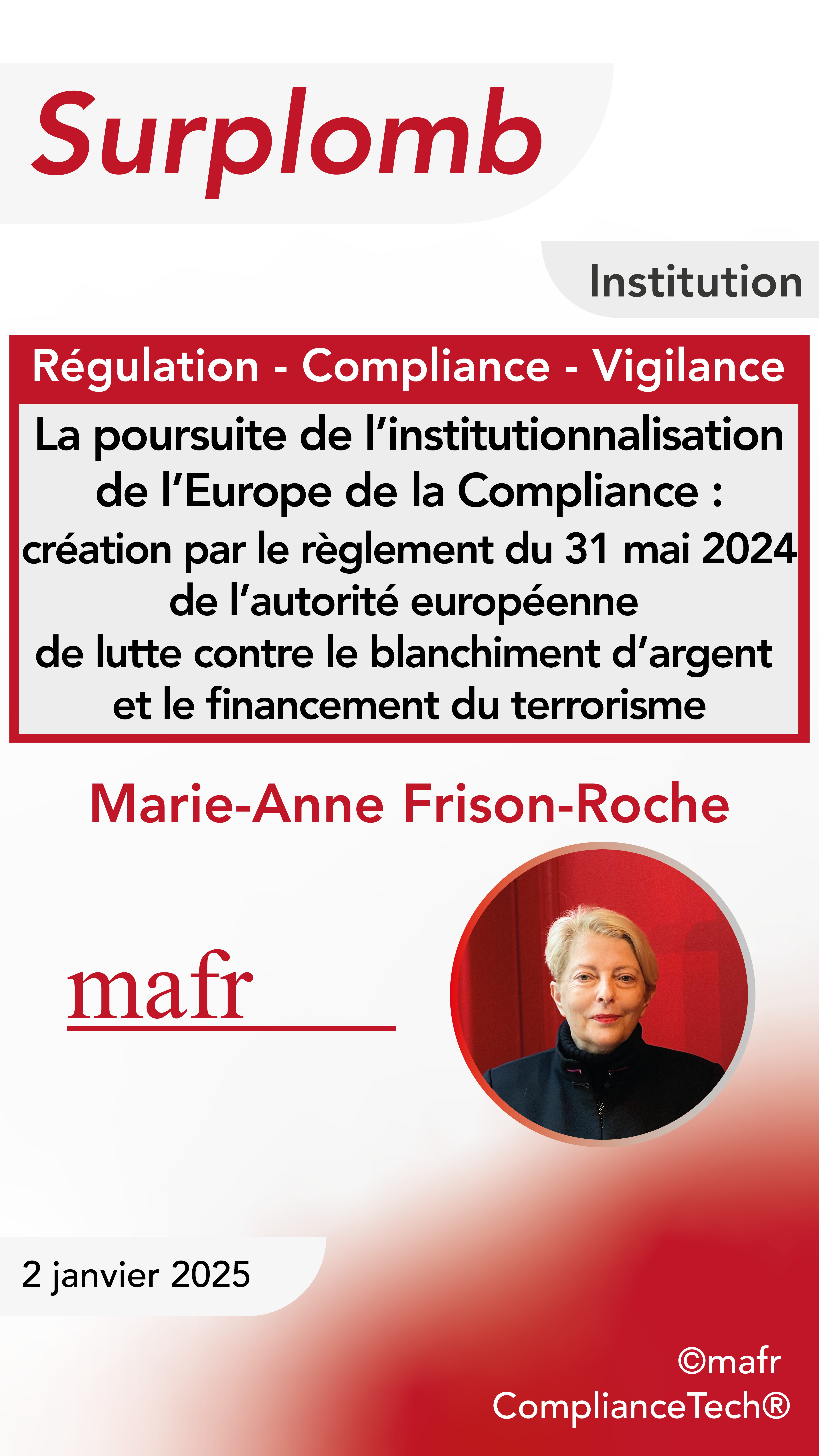


20 décembre 2024
MAFR TV : MAFR TV - Surplomb

🌐suivre Marie-Anne Frison-Roche sur LinkedIn
🌐s'abonner à la Newsletter MAFR. Regulation, Compliance, Law
🌐s'abonner à la Newsletter Surplomb, par MAFR
____
► Référence complète : M.-A. Frison-Roche, "Les contours géographiques de la Compliance", in série de vidéos Surplomb, 20 décembre 2024
____
🌐visionner sur LinkedIn cette vidéo de la série Surplomb
____
____
🎬visionner ci-dessous cette vidéo de la série Surplomb⤵️
____
Surplomp, par mafr
la série de vidéos dédiée à la Régulation, la Compliance et la Vigilance
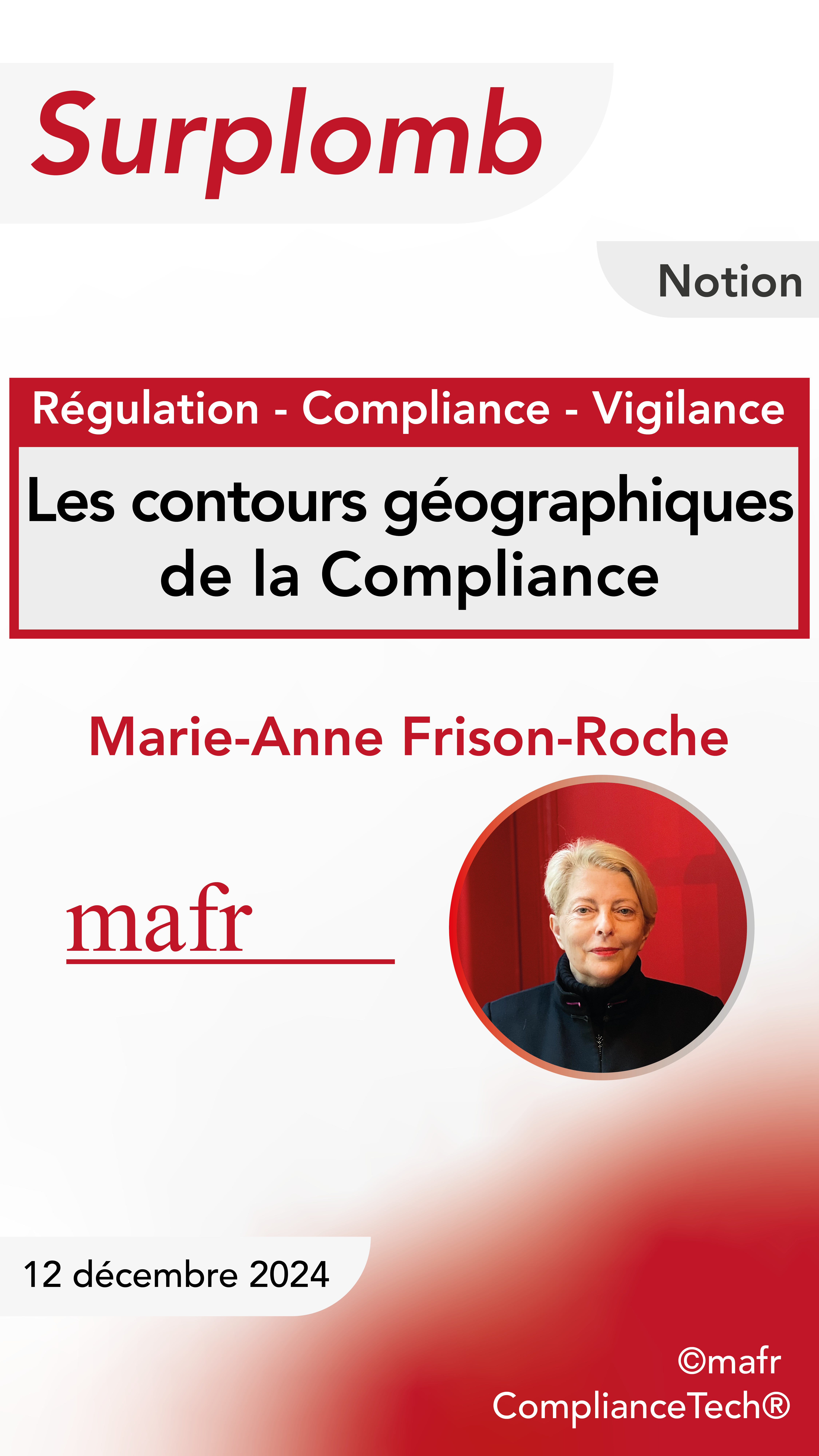

5 novembre 2024
Publications

🌐suivre Marie-Anne Frison-Roche sur LinkedIn
🌐s'abonner à la Newsletter MAFR Regulation, Compliance, Law
____
► Référence complète : M.-A. Frison-Roche, "Naissance d'une branche du Droit : le Droit de la Compliance", in Mélanges offerts à Louis Vogel. La vie du droit, LexisNexis - Dalloz - LawLex - LGDJ, 2024, pp. 177-188.
____
📗Lire la présentation générale des Mélanges offerts à Louis Vogel
____
____
____
► Résumé de l'article : L’étude porte sur les différents mouvements qui ont fait naître le Droit de la Compliance, l’accent étant plus particulièrement mis sur le Droit de la Concurrence.
Après une réflexion préalable sur la construction du système juridique en branches du Droit, leur classement les unes par rapport aux autres, la difficulté rencontrée à ce propos par le Droit économique, et les différents mouvements qui en font naître une, diversité dont la branche garde par la suite la trace, l’étude est construite en 4 parties.
Pour rechercher ce qui a fait naître le Droit de la Compliance, la première partie convie à récuser la perspective étroite d’une définition qui se contente de définir celui-ci par le fait de « se conformer » aux réglementations applicables. Cela a pour effet d’accroître l’efficacité de celles-ci mais cela ne produit pas une branche du Droit, étant un outil d’efficacité comme un autre.
La deuxième partie de l’étude vise à éclaircir ce qui apparaît comme une « énigme », car l’on affirme souvent que cela viendrait d’une méthode souple, ou d’un texte américain, ou d’autant de réglementations qu’il y a d’occasions d’en prendre. Il apparaît plutôt qu’il s’est agi aux États-Unis au sortir de la crise de 1929, d’établir une autorité et des règles pour prévenir un nouvel effondrement atroce de système, tandis qu’il s’est agi en Europe, en 1978, en souvenir de l’usage des fichiers, d’établir une autorité et des règles pour prévenir une atteinte atroce aux droits humains. Un élément commun qui vise l’avenir (« plus jamais ça »), mais pas le même objet de rejet préventif. Cette différence des deux naissances explique l’unicité et la diversité des deux Droits de la compliance, les tensions qui peuvent exister entre les 2, l'impossibilité d'obtenir un Droit global.
La troisième partie analyse la façon dont le Droit de la concurrence a fait naître en son soin la conformité : une branche secondaire qui est gage de conformité à la réglementation concurrentielle. Notamment développée ainsi à travers le droit souple émis par les autorités de concurrence, il en résulte une sorte d’obéissance souple, une collaboration bien comprise de type procédurale par laquelle l’entreprise éduque, surveille, voire sanctionne, sans sortir du Droit de la Concurrence dont la conformité constitue l’annexe. L’on peut mesurer ici le chemin qui sépare une culture de conformité d’un Droit de la Compliance.
La quatrième partie vise à montrer que le Droit de la Concurrence et le Droit de la Compliance sont deux branches du Droit autonomes et articulées. Le Droit de la Compliance étant une branche du Droit construite sur des Buts Monumentaux, notamment la durabilité des systèmes et la préservation des êtres humains qui y sont impliqués pour qu’ils n’y soient pas broyés mais en bénéficient, l’enjeu actuel de la construction européenne est de construire à côté du plier concurrentiel le pilier du Droit de la Compliance. Les juridictions sont en train de le faire et de les articuler.
________
21 octobre 2024
Publications
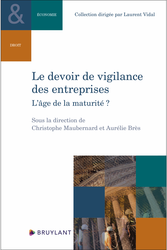
🌐suivre Marie-Anne Frison-Roche sur LinkedIn
🌐s'abonner à la Newsletter MAFR. Regulation, Compliance, Law
🌐s'abonner à la Newsletter Surplomb, par MAFR
____
► Référence complète : M.-A. Frison-Roche, "Devoir de vigilance : progresser", in Ch. Maubernard & A. Brès (dir.), Le devoir de vigilance des entreprises. L'âge de la maturité ?, Bruxelles, Bruylant, coll. "Droit & Economie", 2024, pp. 221-251
____
____
🚧lire le document de travail bilingue sur la base duquel cet article a été élaboré, doté de développements supplémentaires, de références techniques et de liens hypertextes.
____
► Résumé de l'article : En 2017 en France la loi dite Vigilance a exprimé une grande ambition. Le projet de directive aussi. Mais en 2024 les institutions européennes ont modéré cette ambition en n'accroissant ni le type d'entreprises assujetties ni les contraintes auxquelles le devoir de vigilance est associé. La directive a sur l'essentiel arrêté ce qui était pour certain la "marche du progrès". L'ambition n'existe-t-elle plus ? L'avenir est-il à une extension de la philosophie du devoir de vigilance, c'est-à-dire d'entreprises qui devraient toujours se soucier plus d'autrui ? Ce qui serait alors aboutir sans doute à "l'âge de la maturité", là où d'autres voient l'âge de la folie, car cela serait un contresens de demander à une entreprise de se soucier d'autre chose que de son propre déploiement.
Il convient donc d'envisager cette hypothèse même d' "âge de la maturité" comm étant une ambition maintenue malgré une directive qui dans sa version adoptée est affaiblie et des oppositions intactes (I). Il faut tout d'abord admettre que la notion de "maturité" cache le plus souvent un jugement de valeur lorsqu'elle est appliquée à une notion juridique (I.A.) et que cela est flagrant concernant le devoir de vigilance qui est considéré par les uns et par nature par les uns comme un bien et par les autres comme un mal (B).
Pour ne pas demeurer ce qui apparaît comme une guerre de tranchée, il faut ne pas s'enfermer excessivement dans la législation de référence de 2017 et ce qui paraît être un bégaiement européen en 2024, en se disputant avec tant d'éclats de voix qu'on les entend raisonner à l'écrit, en prêtant attention à des voies de progrès moins visibles et aujourd'hui plus prometteurs (II). En effet, le devoir de vigilance peut progresser par le seul effet de l'écoulement du temps (A), par une meilleure fixation du vocabulaire (B), par la consolidation des principes de Responsabilité et de Dialogue (C), par l'unicité de la voie juridictionnelle (D).
Cette dernière perspective du progrès que va permettre l'unicité de la voie juridictionnelle mène vers une dernière voie de progrès. En effet et par nature les lois sont des à-coups, d'autant plus violents qu'ils sont disputés. A l'instant si l'on veut progresser, ces deux autres sources que sont le contrat et le juge doivent être favorisés (III). La directive se soucie d'ailleurs à juste titre de l'accès au juge et envisage avec mesure l'efficacité du contrat comme moyen d'efficacité du devoir de vigilance, le juge devant veiller à ce que le contrat ne détruise pas l'esprit du système. C'est écrire ce que le Droit connait déjà entre le rapport entre le contrat, le juge et l'Obligation de compliance (A). La nouveauté de 2024 tiendra plutôt dans l'institution d'un Superviseur (B). Là encore, l'on retrouve la vigilance comme "pointe avancée" du Droit de la compliance, car celui-ci prolonge le Droit de la régulation.
Il en résulte en cela, par l'interprétation, le maniement des principes, et pour formuler une conclusion plus générale, c'est le juge qui tient et tiendra l'équilibre du devoir de vigilance.
________

9 octobre 2024
Publications

🌐suivre Marie-Anne Frison-Roche sur LinkedIn
🌐s'abonner à la Newsletter MAFR Regulation, Compliance, Law
🌐s'abonner à la Newsletter en vidéo MAFR Surplomb/Overhang
____
 ► Référence complète : M.-A. Frison-Roche, Les Buts Monumentaux, ancrage normatif de la Compliance, document de travail, février 2025.
► Référence complète : M.-A. Frison-Roche, Les Buts Monumentaux, ancrage normatif de la Compliance, document de travail, février 2025.
____
🎤 Ce document de travail a été élaboré pour servir de base tout d'abord :
à la vidéo Surplomb👁 du 9 octobre 2024 : cliquer ICI
____
🎬🎬🎬Dans la collection des Surplomb👁 Il s'insère dans la catégorie des Notions.
►Voir la collection complète des Surplombs👁 : cliquer ICI
____
► Résumé du document de travail : La Compliance, dont la conformité n'est qu'un instrument (il ne faut pas confondre les 2) doit être comprises à travers les "Buts Monumentaux", ambitions politiques poursuivies par les autorités publiques et internalisées dans les entités en position de les atteindre, à savoir les grandes entreprises.
Ces Buts sont Monumentaux en ce qu'ils concernent les systèmes : faire en sorte qu'à l'avenir ces systèmes ne s'effondrent pas = "Buts Monumentaux Négatifs" (ex : lutte contre la corruption, contre le changement climatique) ; plus ambitieux encore, ils peuvent viser à améliorer les systèmes = "Buts Monumentaux Positifs" (ex : égalité effective entre les femmes et les hommes).
Leur nature systémique engendre en reflet un Contentieux Systémique.
____
🔓lire les développements ci-dessous⤵️

9 octobre 2024
MAFR TV : MAFR TV - Surplomb

🌐suivre Marie-Anne Frison-Roche sur LinkedIn
🌐s'abonner à la Newsletter MAFR. Regulation, Compliance, Law
🌐s'abonner à la Newsletter Surplomb, par MAFR
____
► Référence complète : M.-A. Frison-Roche, "Les Buts Monumentaux, ancrage normatif de la Compliance", in série de vidéos Surplomb, 9 octobre 2024
____
🌐visionner sur LinkedIn cette vidéo de la série Surplomb
____
____
🎬visionner ci-dessous cette vidéo de la série Surplomb⤵️
____
Surplomp, par mafr
la série de vidéos dédiée à la Régulation, la Compliance et la Vigilance
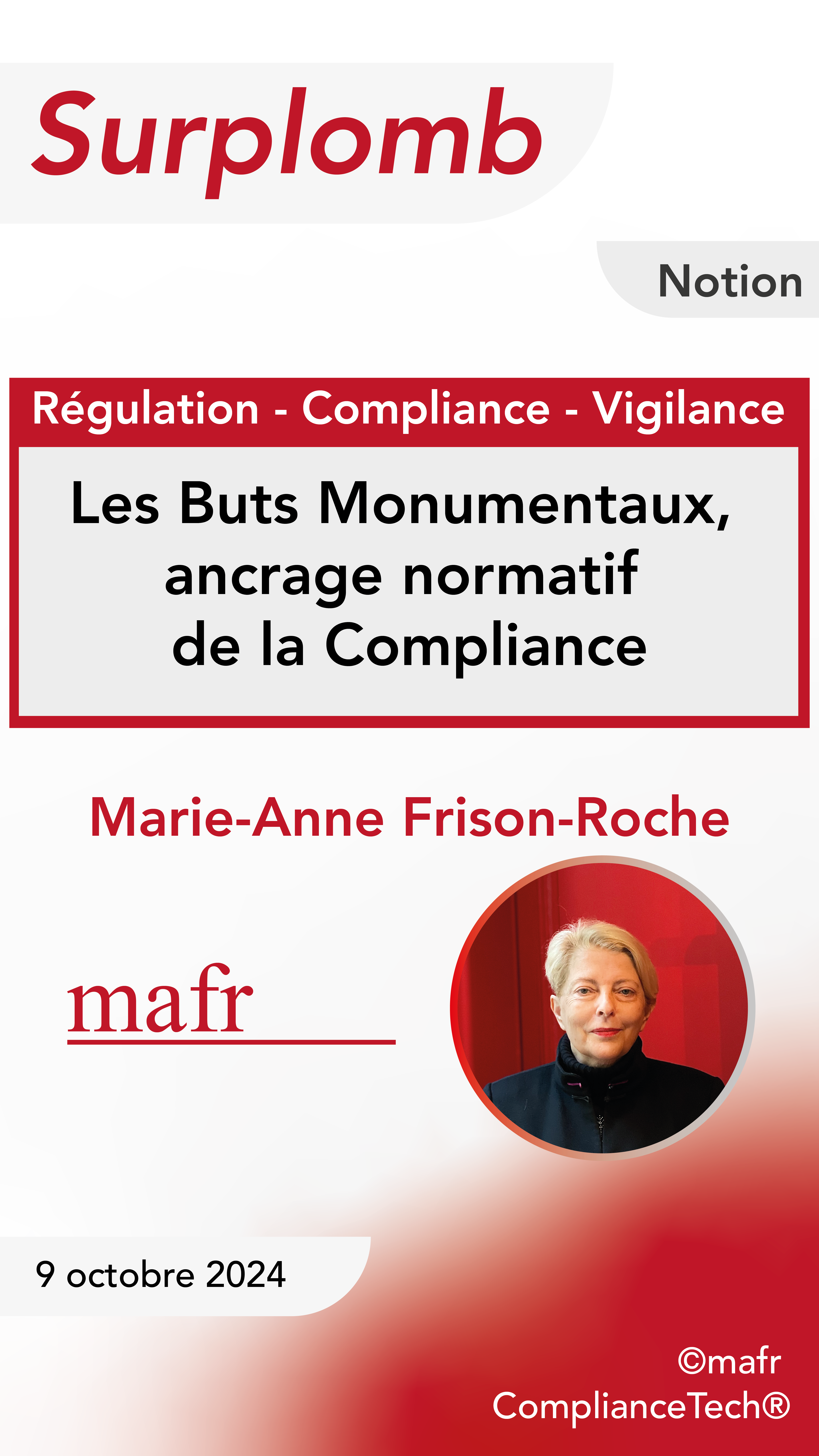

19 septembre 2024
Conférences

🌐suivre Marie-Anne Frison-Roche sur LinkedIn
🌐s'abonner à la Newsletter MAFR Regulation, Compliance, Law
____
► Référence complète : M.-A. Frison-Roche, "Comment s’adapter au Contentieux Émergent de la Compliance", in , Association nationale des juristes de banque (ANJB), 19 septembre 2024, Paris, 9h-10h30
____
Cette conférence se tient avec un autre intervenant, Maître Jean-Pierre Picca.
Elle est suivie d'un échange avec l'auditoire.
____
🧮consulter le programme complet de cette manifestation
____
► Résumé de la conférence : Le contentieux qui est en train de naître des normes de Compliance est d'un type nouveau, souvent devant le juge de droit commun, notamment à travers la Vigilance, pointe avancée de la Compliance. Le comprendre pour s'y adapter et y jouer son rôle : c'est l'enjeu qu'il faut immédiatement relever.
Le Droit de la Compliance est une nouvelle branche du Droit, de nature téléologique, dont la normativité juridique est ancrée dans ses buts. Il s'agit de buts systémiques de préserver des systèmes par la détection des risques qui les fragilisent et la prévention des défaillances qui peuvent les détruire. Il s'agit donc d'un Droit Ex Ante, dont la réalisation va peser sur les "entités" en position pour détecter les risques et prévenir les défaillances afin que ces buts systémiques soient atteints. A ce titre, il s'agit de "buts monumentaux" en ce qu'il s'agit de buts de nature politique visant des systèmes complets. Il est donc essentiel de distinguer la "conformité", qui ne consiste qu'à se "conformer" à la réglementation applicable et le Droit de la Compliance, qui consiste à contribuer à la réalisation de ces Buts Monumentaux", soit de force (obligation légale) soit de gré (Raison d'être, entreprise à mission, obligation contractuelle, RSE). En cela, la Compliance est à la fois beaucoup plus restreinte dans ses buts et beaucoup plus ambitieux, puisqu'il s'agit de la construction de l'avenir et non pas du respect mécanique de la réglementation.
Or, le secteur bancaire, que l'on peut considérer comme une exception par rapport au principe de Concurrence, qui repose sur la mobilité extrême et l'absence de rente, la destruction du plus faible, la prise de risque, l'absence de solidité de l'opérateur ne posant pas problème, apparaît comme le parangon du principe de Compliance, qui repose sur la durabilité des systèmes assurée par la solidité des opérateurs eux-mêmes, leur solidarité, l'échange d'information, des superviseurs intégrés. Par exemple, le devoir de vigilance et l'information sur autrui, la Régulation par la Supervision sont nés dans ce secteur qui a internalisé dans les banques ce souci sectorial, lui-même porteur d'un souci général, notamment dans la conception européenne de la banque continentale. L'Union Bancaire l'a accru.
Dès lors, l'on va internaliser dans les banques des soucis sur l'avenir qui vont au-delà de la préservation du secteur bancaire, comme la prévention du risque systémique climatique ou l'éducation de la population ou la préservation de la population en situation de faiblesse.
Le Contentieux qui va en naître est lui-même très particulier. C'est l'objet de cette conférence que d'en dégager les clefs de compréhension pour que les banques y jouent leur rôle.
En effet, le Contentieux de la Compliance Émergent est de nature systémique. Il se constitue en reflet de l'organisation Ex Ante par laquelle on demande à des entités de prendre en charge une contribution à la réalisation de Buts Monumentaux. Par un litige entre deux parties qui s'affrontent, une personne ou une ONG ou un syndicat ou une municipalité ou un Etat et une banque, se déploie dans l'instance une partie entre ce que l'on peut appeler celui qui prétend porter l'intérêt présent et à venir d'un système, par exemple le système climatique ou le système des relations sociales, et la banque qui porte une "obligation de compliance" légalement posée de contribuer à protéger ce système.
Cela va à l'encontre d'une présentation tactique souvent faite du contentieux de la Compliance comme un système de sanction, plus efficace parce que porté de l'Ex Post vers l'Ex Ante. La présentation en est alors la suite : il s'agit alors de sorte "criminels-nés" que seraient les grandes entreprises qui seraient punis par avance, par un déplacement de la répression de l'Ex Post vers l'Ex Ante : cela n'est pas cela, il ne s'agit pas de punir des "responsables" qui ont déjà corrompu et corrompront toujours, qui ont déjà blanchi et blanchiront toujours, qui ont toujours pollué et pollueront toujours, qui ont toujours piétiné les droits des personnes et les piétineront toujours. Donc, selon un portrait-robots de l'entreprise destructrice-née, il s'agirait alors de la punir aujourd'hui du mal qu'elle a vocation à faire demain.
Beaucoup suivent cette présentation : elle est fallacieuse.
Il ne faut pas laisser cette présentation inexacte de ce qu'est le Contentieux de la Compliance occuper les esprits car au contraire ce contentieux est au contraire un contentieux de type non pas répressif mais un contentieux non-répressif (civil, commercial, arbitral),de type systémique, où les opérateurs économiques cruciaux des secteurs économiques impliqués ont un rôle essentiel à jouer face à un juge non-répressif (juge civil, arbitre, régulateur, juge consulaire, juge administratif) dans des "causes systémiques" où le litige implique un système dans lequel l'opérateur économique, par exemple la banque, joue un rôle essentiel, dans un continuum entre l'Ex Ante et l'Ex Post. Les contentieux de Vigilance en sont la pointe avancée.
____
Il faut comprendre la construction systémique de l'instance.
Il ne faut pas que la banque se laisse enfermer dans son seul rôle de litigant tandis que l'autre partie, par exemple une ONG, en ce qu'elle se pose comme dépositaire de la "société civile" ou du "système climatique" ou de "l'égalité effective entre les êtres humains" dépasse ce cercle et importe dans l'instance le système lui-même.
C'est ici que l'adaptation doit avoir lieu.
________
Cette adaptation est à la fois procédurale, probatoire et substantielle.
L'adaptation procédurale doit s'opérer avant même tout contentieux puisqu'il y a un continuum entre l'Ex Ante et l'Ex Post, le judiciaire n'étant lui-même qu'un mode d'accountability (reddition des comptes) parmi d'autres. Cette reddition des comptes s'opère par rapport à une "mission" qui est confiée aux banques par rapport aux buts : prévention, détection et lutte contre la corruption, le blanchiment, le changement climatique, etc., par la construction d'alliance, le bon usage d'information (savoir en prendre, savoir ne pas les transmettre, savoir les transmettre).
La procédure, c'est-à-dire la façon de faire, doit traduire un élément substantiel, en ce que cela engendre le "sens des responsabilités" : le Droit de la Compliance a pour objet de "responsabiliser" les puissances et de prendre appui sur les positions de puissance. La procédure adéquate consiste dans un "bon usage de sa puissance" au bénéfice d'autrui. Les techniques de "prises en considération d'autrui" sont un élément essentiel. La "prise en considération" par celui qui accepte d'exercer le pouvoir (le pouvoir de financer, le pouvoir de recueillir l'information, le pouvoir de s'organiser ensemble, le pouvoir de contracter).
L'adaptation "probatoire" : indifférence des obligations et droits probatoires par rapport à la place processuelles des parties. L'entreprise a une "obligation de compliance" même si elle est processuellement en défense. L'objet de preuve lui est donné par les Buts Monumentaux que la Loi ou sa propre volonté lui demandent de contribuer à atteindre. Sa charge consiste à montrer qu'elle contribue à la réalisation de ces buts, en agissant pour l'avenir (par exemple par la connaissance de son client, ou par la prises en considération des intérêts des parties prenantes, etc.).
______
► Structuration de l'intervention :
I. La situation actuelle : subir les conséquences néfastes d'une réduction du Droit de la Compliance à la mécanique de "conformité"
II. L'opportunité pour les banques de s'adapter par la compréhension du Droit de la Compliance par le dépassement de la mécanique de la conformité : le puzzle européen, son apparente complexité, sa clarté architecturale (CSRD/CS3D/DSA)
III. L'opportunité pour les banques de ne pas se laisser enfermer dans des procès qui ne sont que des sanctions, transférées de l'Ex Post vers l'Ex Ante : l'émergence es procès systémiques de Compliance devant les juridictions de droit commun (loi de 2017; arrêts Paris, 18 juin 2024).
IV. Ce qui est attendu des banques dans les procès systémiques de compliance et de vigilance devant les juridictions de droit commun, reflet du dialogue et de l'action requises par le Droit de la Compliance (article à paraître).
V. L'opportunité pour les banques de s'adapter à la nouvelle dimension probatoire du Contentieux émergent de la Compliance et de la Vigilance (article à paraître).
VI. L'opportunité pour les banques de s'adapter à la nouvelle dimension Ex Ante du Contentieux systémique de la Compliance et de la Vigilance, contentieux portant sur l'avenir (article à paraître).
____
► Quelques pistes bibliographiques :
🕴️M.-A. Frison-Roche, 📝Le Droit de la Compliance, 2016
🕴️M.-A. Frison-Roche, 📝Compliance et conformité : les distinguer pour les articuler, 2024
🕴️M.-A. Frison-Roche, 📝Devoir de vigilance : progresser, 2024
🕴️M.-A. Frison-Roche, 📝Le Contentieux systémique, 2024
________
13 juin 2024
Interviews

► Référence complète : M.-A. Frison-Roche, "Entreprises et compliance : une justice et des juges plus offensifs", entretien mené par J.-Ph. Denis à l'occasion d'une série d'entretiens sur le Droit de la Compliance, in Fenêtres ouvertes sur la gestion, émission de J.-Ph. Denis, Xerfi Canal, enregistré le 12 décembre 2023, diffusé le 14 juin 2024
____
🌐consulter sur LinkedIn la présentation en décembre 2023 de l'entretien
____
🌐consulter sur LinkedIn la vidéo de l'entretien
____
🧱 consulter la présentation générale de cette série d'entretiens sur le Droit de la Compliance
____
🎥visionner l'interview complète sur Xerfi Canal
____
► Point de départ : depuis 2016, Marie-Anne Frison-Roche construit le Droit de la Compliance, notamment par une collection coéditée en français avec les Editions Dalloz et coéditée en anglais avec les Editions Bruylant :
🧱lire la présentation de la collection en langue française, Régulations & Compliance ➡️cliquer ICI
🧱read the presentation of the series in English, Compliance & Regulation ➡️cliquer ICI
____
► Résumé de l'entretien :
Jean-Philippe Denis. Question :
Marie-Anne Frison-Roche. Réponse. :
___
J.-Ph D. Q. : Ainsi
MaFR. R. : Oui,
____
J.-Ph. D. Q. : Ainsi
MaFR. R. : Oui,
________
18 avril 2024
Publications
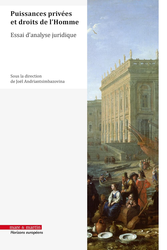
🌐suivre Marie-Anne Frison-Roche sur LinkedIn
🌐s'abonner à la Newsletter MAFR Regulation, Compliance, Law
🌐s'abonner à la Newsletter en vidéo MAFR Surplomb
____
► Référence complète : M.-A. Frison-Roche, "L’usage des puissances privées par le droit de la compliance pour servir les droits de l’homme", in J. Andriantsimbazovina (dir.), Puissances privées et droits de l'Homme. Essai d'analyse juridique, Mare Martin, coll. "Horizons européens", 2024, pp. 279-295
____
🚧lire le document de travail bilingue sur la base duquel cet article a été élaboré, doté de développements supplémentaires, de références techniques et de liens hypertextes
____
► Résumé de l'article : Si l’on suit la tradition du Droit l’on associera la puissance à une source légitime qu’est l’État, la puissance publique étant son apanage, les entreprises n’exerçant leur puissance que dans l’ombre portée de cette puissance Ex Ante. À l’inverse la trivialité du Droit économique, dont le Droit de la concurrence serait le cœur, consistant à partir de l’activité des entreprises qui utilisent leurs puissances sur des marchés, relèguent l’action de l’État au rang d’exception, admissible si celui-ci, qui prétend exercer cette puissance contraire, le justifie. La distribution des rôles est donc symétrique, en ce que les places sont échangées, mais le modèle de l’opposition est partagé. Ce modèle de l’opposition épuise les forces des organisations qui sont reléguées à n’être que soit le principe soit l’exception. Or, si l’on veut porter de grandes ambitions, par exemple concrétiser des droits humains au-delà du système juridique à l’intérieur duquel les Autorités publiques exercent leurs pouvoirs normatifs, il faut s’appuyer sur une nouvelle branche du Droit, remarquable par son pragmatisme et par l’ampleur des ambitions, y compris humanistes, qu’elle porte : le Droit de la Compliance.
Il apparaît que le Droit de la Compliance est ainsi la branche du Droit qui fait porter le souci d’autrui, concrétisé par des droits humains, par les entités en position de le satisfaire, entités que sont les entités systémiques, les grandes entreprises en étant l’exemple privilégié, sujets de droit directs de la Compliance (I). Il en résulte une nouvelle répartition entre les autorités publiques, légitimes à formuler le But Monumental de protéger les êtres humains, et les organisations privées, qui s’ajustent à cela selon le type de droits humains et au regard des moyens mis en place pour les préserver. Les entreprises sont recherchées parce qu’elles sont puissantes, en ce qu’elles sont en position de concrétiser les droits humains, dans leur indifférence au territoire, dans la centralisation des informations, des technologies et des moyens économiques, humains et financiers. Cette alliance est essentielle pour que le système ne conduise pas à un transfert de choix politique et que cela aboutisse à une efficience systémique. Il en résulte une nouvelle définition de la souveraineté telle qu’on la voit se dessiner dans l’espace numérique, lequel n’est pas un secteur particulier puisque c’est le monde qui s’est digitalisé, la question climatique justifiant la même nouvelle répartition des rôles (II).
____
________
4 avril 2024
Publications
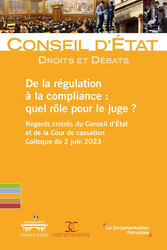
🌐suivre Marie-Anne Frison-Roche sur LinkedIn
🌐s'abonner à la Newsletter MAFR Regulation, Compliance, Law
____
► Référence complète : M.-A. Frison-Roche, "Le rôle du juge dans le déploiement du droit de la régulation par le droit de la compliance", in Conseil d'État et Cour de cassation, De la régulation à la compliance : quel rôle pour le juge ? Regards croisés du Conseil d'Etat et de la Cour de cassation - Colloque du 2 juin 2023, La Documentation française, coll. "Droits et Débats", 2024, pp. 173-182
____
🎥cet article fait suite à l'intervention de clôture prononcée lors du colloque biannuel organisé par la Cour de cassation et le Conseil d'État, qui portait en 2023 sur le thème De la régulation à la compliance : quel rôle pour le juge ?, le 2 juin 2023
____
🚧lire le document de travail bilingue sur la base duquel cet article a été élaboré, doté de développements supplémentaires, de références techniques et de liens hypertextes
____
► Présentation de l'article de synthèse : Il est remarquable de constater l'unité de conception et de pratiques entre les professionnels qui évoluent plutôt dans l'ordre des juridictions administratives et les professionnels qui évoluent plutôt dans l'ordre des juridictions judiciaires : ils constatent tous et dans des termes semblables un mouvement essentiel : ce qu'est le Droit de la Régulation, comment celui-ci a opéré sa transformation en Droit de la Compliance, et comment dans l'un et plus encore dans l'autre le Juge y est au centre.
Les juges, mais aussi les Régulateurs et les responsables européens l'expliquent et disent à partir d'exemples différents la transformation profonde que cela apporte pour le Droit, pour les entreprises en charge d'accroître l'effectivité systémique des règles par la pratique et la diffusion d'une culture de compliance.
Le Juge participant à cette transformation Ex Ante voit son office renouvelé, qu'il soit juge de droit public ou juge de droit privé, dans une unité accrue du système juridique.
____
► Résumé de l'article : La querelle de mots qui nous épuise, entre "Compliance" et "conformité", masque l'essentiel, c'est-à-dire la grande nouveauté d'une branche du Droit qui assume une vision humaniste exprimant l'ambition de modeler l'avenir, afin que celui-ci ne soit pas catastrophique (prévention de l'effondrement des systèmes), voire qu'il soit meilleur (protection des êtres humains dans ces systèmes).
L'article décrit tout d'abord l'émergence du Droit de la Compliance, en prolongement du Droit de la Régulation et en dépassement de celui-ci. Cette nouvelle branche du Droit rend compte d'un monde nouveau, en porte les bénéfices et veut parer à ces dangers systémiques pour que les êtres humains en bénéficient et n'en soient pas broyés. Cette branche du Droit Ex Ante est en cela politique, souvent portée par des Autorités publiques, comme les Autorités de Régulation, mais dépasse aujourd'hui les secteurs, comme le montre sa pointe avancée qu'en est le devoir de Vigilance.
Les "Buts Monumentaux" dans lesquels s'ancre normativement le Droit de la Compliance implique une interprétation téléologique, mène à une "responsabilisation" des opérateurs cruciaux, non seulement les Etats mais encore les entreprises, en charge de l'effectivité des multiples nouveaux outils de compliance.
L'article montre ensuite que le juge est toujours plus au centre du Droit de la Compliance. En effet, les procès visent à responsabiliser les entreprises. Dans cette transformation, le juge a aussi pour fonctionner de demeurer le gardien de l'Etat de Droit, aussi bien dans la protection des droits de la défense que dans celle des secrets, l'efficacité n'étant pas ce qui définit la Compliance, qui ne serait être réduite à une pure et simple méthode d'efficacité, ce qui mènerait à être un instrument de dictature. C'est pourquoi le principe de proportionnalité est essentiel dans le contrôle que le juge opère des exigences issues de cette branche du Droit si puissante.
Le juge est ainsi saisi d'un contentieux d'un type nouveau, de nature systémique, dans l'espace qui lui est propre et qu'il ne faut pas dénaturer : l'espace de justice.
____
________
4 avril 2024
Base Documentaire : Doctrine

► Référence complète : Conseil d'État et Cour de cassation, De la régulation à la compliance : quel rôle pour le juge ? Regards croisés du Conseil d'Etat et de la Cour de cassation, La Documentation française, coll. "Droits et Débats", 2024, 241 p.
____
____
____
► Présentation de l'ouvrage : "La compliance, parfois traduite par « conformité », se situe dans le prolongement du droit de la régulation et en constitue un nouveau pas décisif.
La compliance rassemble l’ensemble des mécanismes mis en œuvre au sein d’une organisation pour atteindre des objectifs d’intérêt général (sécurité, durabilité) contrant ainsi les risques systémiques. Les entreprises, s’appuyant sur les règles, normes juridiques et éthiques qui portent ces valeurs qui s’imposent à elles et leur sont internalisées, peuvent tout à la fois prévenir le risque de sanctions et participer à cette alliance entre autorités publiques, opérateurs économiques et parties prenantes pour détecter et prévenir les catastrophes systémiques futures.
Organisé par le Conseil d’État et la Cour de cassation, le colloque du 2 juin 2023, sur la base duquel cet ouvrage a été construit, a analysé ce changement de paradigme créé par cette nouvelle branche du droit: le Droit de la compliance".
____
🕴️🕴️Liste des auteurs :
🕴️Didier-Roland Tabuteau
🕴️Christophe Soulard
🕴️François Molins
🕴️François Molinié
🕴️Marie-Anne Barbat-Layani
🕴️Jean-Yves Ollier
🕴️Daniel Calleja y Crespo
🕴️Christine Guéguen
🕴️Vincent Vigneau
🕴️François Ancel
🕴️Astrid Mignon Colombet
🕴️Lucien Rapp
🕴️Alain Seban
🕴️Christophe Chantepy
🕴️Roch-Olivier Maistre
🕴️Paul Nihoul
🕴️Jean-François Bohnert
🕴️Joëlle Tolédano
🕴️Marie-Anne Frison-Roche
____
📝lire une présentation de l'article de synthèse de Marie-Anne Frison-Roche : "Le rôle du juge dans le déploiement du droit de la régulation par le droit de la compliance"
____
📝lire une présentation de l'article de François Ancel : "Quel rôle pour le juge aujourd’hui dans la compliance ? Quel office processuel du juge dans la compliance ?"
________
2 avril 2024
Conférences

🌐suivre Marie-Anne Frison-Roche sur LinkedIn
🌐s'abonner à la Newsletter MAFR Regulation, Compliance, Law
____
► Référence complète : M.-A. Frison-Roche, "Les voies d'innovations juridiques face aux nouveaux "défis climatiques"", in C. Arnaud, O. de Bandt et B. Deffains (dir.), Innovations économiques et juridiques face aux défis climatiques. Nouveaux défis regards croisés : Droit Économie et Finance, Banque de France et CRED/Université Paris Panthéon-Assas, Paris, Centre de Conférence de la Banque de France, 2 avril 2024
____
🧮Consulter le programme complet de cette manifestation
____
🔲consulter les slides ayant servi de support à la conférence
____
► Présentation de la conférence : À la question posée de la façon dont le Droit peut produire des "innovations" pour répondre aux "défis climatiques", il est procédé à partir des trois sources traditionnelles du Droit, que sont en premier lieu les lois et réglementations, en deuxième lieu les engagements des personnes et principalement les contrats, et en troisième lieu les décisions de justice.
À première vue, le Droit dans sa conception et son fonctionnement classique est faible face au changement climatique. Cette faiblesse est inhérente à la nature du changement climatique, qui est à la fois futur, global et systémique, face à ces trois sources du Droit qui s'appréhendent pas ces trois dimensions à la fois. L'on mesure donc l'ampleur de l'innovation juridique requise pour qu'une source, ou plusieurs articulées, puissent se saisir du futur, du global et du système. C'est pourtant ce qui est en train de se produire.
En ce qui concerne les lois et réglementations, elles paraissent peu appropriées parce qu'elles sont par nature une limite territoriale, les traités internationaux étant très difficiles à négocier. L'intermaillage des règlements européens, par exemple la CSRD et la CS3D qui se font miroir, peut être plus efficace. En ce qui concerne les "engagements", notion qui en Droit demeure peu précise en dehors du contrat et des hypothèses de responsabilité📎
Mais un changement majeur est intervenu par l'émergence d'une nouvelle branche du Droit : le Droit de la Compliance, branche téléologique du Droit dont la normativité juridique est logée dans les Buts Monumentaux📎
Dans cette perspective globale, systémique, extraterritoriale et dont l'objet est le futur, le Droit de la Compliance étant d'ailleurs rejeté par de nombreux juristes, l'innovation législative est majeure. En effet, la loi du 27 mars 2017, dite "Vigilance" a désigné les grandes entreprises, parce qu'elles sont "puissantes", parce qu'elles sont "en position d'agir" pour "détecter et prévenir" les atteintes à l'environnement et aux droits humains. La loi de 2017 a recopié les "outils de compliance"📎
Sont sujets de droit uniquement les grandes entreprises puisqu'elles sont seules en position d'agir, ici les "sociétés-mères ou les entreprises donneuses d'ordre", et les frontières ne sont plus des limites puisque l'obligation, créant une responsabilité personnelle de l'entreprise📎
Sur le deuxième point, à savoir celui des engagements, nous n'en sommes qu'au début. En effet, les juges ne transforment pas les propos ou les déclarations éthiques en "engagements juridiques unilatéraux" et la vigilance ne transforme pas le Droit des sociétés en cogestion des entreprises. Mais les contrats forment un intermaillage global par lequel les entreprises ajustent leurs diverses obligations légales. C'est ainsi que les arbitres, les seuls "juges globaux", vont bientôt entrer dans ce contentieux systémique📎
Mais le plus innovant vient sans doute de la part des juridictions. Peut-être parce que c'est de là où l'on s'y attend le moins, le juge civil du fond, que vient l'imagination mais aussi la garde des grands principes de l'État de Droit car pour l'instant la jurisprudence est raisonnable. Cette innovation n'est pas venue proprio motu : les juges ne se saisissent pas, ce sont les ONG qui mènent une sorte de politique contentieuse, en mettant en demeure systématiquement les grandes entreprises énergétiques, mais aussi les grandes banques et les grands assureurs sur les questions climatiques en alléguant la non-conformité de leur plan de vigilance. Le juge des référés du Tribunal judiciaire de Paris doit alors apporter des réponses dans des contentieux systémiques, dont le cas dit "Total Ouganda"📎
Les juridictions font preuve de beaucoup d'innovations. Le juge des référés du Tribunal judiciaire a nommé des amici curiae📎
En conclusion, le Droit est en train de se reconstruire à travers une nouvelle branche du Droit, le Droit de la Compliance, dont l'objet même, prolongement et dépassement du Droit de la Régulation📎
________
🕴️M.-A. Frison-Roche, 📝Ce qu'est un engagement, in 🕴️M.-A. Frison-Roche (dir.), 📕L'Obligation de Compliance, 2024.
🕴️M.-A. Frison-Roche, 📝Les Buts Monumentaux, cœur battant du Droit de la Compliance, in 🕴️M.-A. Frison-Roche (dir.), 📕Les Buts Monumentaux de la Compliance, 2022.
🕴️M.-A. Frison-Roche (dir.), 📕Les outils de la Compliance, 2021.
🕴️M.-A. Frison-Roche (dir.), 📕L'Obligation de Compliance, 2024, dont un chapitre est consacré à "L'arbitrage international en renfort de l'Obligation de Compliance".
🕴️M.-A. Frison-Roche, 📝Contrat de compliance, clauses de compliance, 2022 ; 🕴️M.-A. Frison-Roche (dir.), 📕Compliance et Contrat, 2024.
🕴️N. Cayrol, 📝L'amicus curiae, mesure d'instruction ordinaire, 2022.
Sur la création de la nouvelle Chambre 5-12, Contentieux émergent – Devoir de vigilance et responsabilité écologique v. 🕴️J. Boulard, 💬Contentieux systémique : "Il est important, pour les magistrats, de rester au plus près des réalités", 28 mars 2024; 🎤Discours du Premier Président. Audience solennelle de rentrée, 15 janvier 2024.
🕴️M.-A. Frison-Roche, 💬"Nous voyons émerger aujourd’hui le contentieux systémique", 28 mars 2024 ; 🕴️M.-A. Frison-Roche, Coordination et animation du cycle de conférences-débats 🧮Contentieux Systémique Émergent.
🏛️Conseil d'État et 🏛️Cour de cassation, 📗De la régulation à la compliance : quel rôle pour le juge ?, 2024 ; 🕴️M.-A. Frison-Roche, 📝Le déploiement du droit de la régulation par le droit de la compliance dans un projet européen, 2023 ; 📝Le Droit de la Compliance au-delà du Droit de la Régulation, 2018 ; 📝Du Droit de la régulation au Droit de la compliance, in 🕴️M.-A. Frison-Roche (dir.), 📕Régulation, Supervision, Compliance, 2017.
🕴️M.-A. Frison-Roche, 📝Le rôle du juge dans le déploiement du droit de la régulation par le droit de la compliance et 🕴️Fr. Ancel, 📝Quel rôle pour le juge aujourd’hui dans la compliance ? Quel office processuel du juge dans la compliance ?, in 🏛️Conseil d'État et 🏛️Cour de cassation, 📗De la régulation à la compliance : quel rôle pour le juge ?, 2024 ; 🕴️Fr. Ancel, 📝Le principe processuel de compliance, un nouveau principe directeur du procès ?, in M.-A. Frison-Roche (dir.), 📕La juridictionnalisation de la Compliance, 2023 ; 🕴️M.-A. Frison-Roche, 📝Le Juge requis pour une Obligation de Compliance effective, in 🕴️M.-A. Frison-Roche (dir.), 📕L'Obligation de Compliance, 2024.
16 mars 2024
Interviews
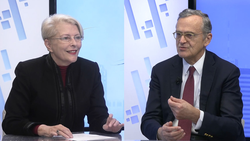
► Référence complète : R.-O. Maistre, "La place du Droit de la compliance dans la régulation de l’espace numérique", entretien mené par M.-A. Frison-Roche à l'occasion d'une série d'entretiens sur le Droit de la Compliance, in Fenêtres ouvertes sur la gestion, émission de J.-Ph. Denis, Xerfi Canal, enregistré le 12 décembre 2023, diffusé le 16 mars 2024
____
🌐consulter sur LinkedIn la présentation en décembre 2023 de l'entretien avec Roch-Olivier Maistre
____
____
🎥visionner l'interview complète sur Xerfi Canal
____
► Point de départ : En 2022, Roch-Olivier Maistre écrit une contribution sur 📝Quels buts fondamentaux pour le régulateur dans un paysage audiovisuel et numérique en pleine mutation ?, dans 📕Les Buts Monumentaux de la Compliance.
🧱lire la présentation de cette contribution ➡️cliquerICI
____
► Résumé de l'entretien :
Marie-Anne Frison-Roche : Question : L’Arcom a un rôle central en matière de Compliance. Pourriez-vous nous présenter cette Autorité de régulation qu’est l’Arcom ?
Roch-Olivier Maistre : Réponse : le Président Roch-Olivier Maistre décrit le rôle de l'Arcom, autorité qui résulte du CSA et de l'Hadopi, le législateur décidant de créer un nouveau grand Régulateur en charge à la fois de l'audiovisuel et du numérique. Cette Autorité collégiale s'assure du bon fonctionnement de ce secteur et est engagée dans la régulation des nouveaux acteurs du numérique.
____
MaFR : Q. : Comment Régulation et Compliance s’articulent-elles dans la mise en œuvre des missions de l’Arcom ?
R.O.M. : R. : Il répond qu'il s'agit d'une approche complémentaire. Coercition, sanctions s'y articulent. Il s'agit de préserver la liberté d'expression et de communication. Pour cela, objectifs de valeur constitutionnelle, les opérateurs doivent agir pour que ces objectifs soient atteints. Pour cela, ils sont supervisés par l'Autorité qu'est l'Arcom, qui intervient qu'ils ne se conforment à ces obligations de compliance. Lorsqu'il ne s'agit pas de l'audiovisuel, où le contenu est encore possible car il s'agit d'un "monde fini", mais qu'il s'agit du monde numérique, où les contenus se répandent d'une façon virale, c'est aux opérateurs d'agir : la Régulation et la Compliance agissent donc d'une façon complémentaire.
________
14 mars 2024
Publications
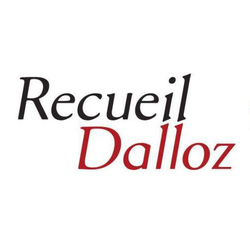
🌐suivre Marie-Anne Frison-Roche sur LinkedIn
🌐s'abonner à la Newsletter MAFR Regulation, Compliance, Law
____
► Référence complète : M.-A. Frison-Roche, "Compliance et conformité : les distinguer pour les articuler", D. 2024, chron., pp. 497-499
____
____
►Lire la présentation des chroniques suivantes :
- "Droit de la compliance et contentieux systémique", 2025
►Lire la présentation des chroniques précédentes :
- "La loi, la compliance, le contrat et le juge: places et alliances", 2023
- "Contrat de compliance, clauses de compliance", 2022
- "L'aventure de la Compliance", 2020
- "Compliance et personnalité", 2019
____
🚧lire le document de travail bilingue sur la base duquel cet article a été élaboré, doté de développements supplémentaires, de références techniques et de liens hypertextes
____
► Résumé de l'article : "Compliance" et "conformité" sont parfois présentées comme synonymes, "conformité" n’étant que la traduction de "compliance". Ce sont au contraire deux conceptions opposées. La "conformité" renvoie à ce qui serait l’obligation de montrer son obéissance à toute la réglementation applicable, dans l’indifférence de la teneur de celle-ci. Aubaine pour le pouvoir réglementaire... Le Droit de la Compliance est tout autre chose ! Les autorités politiques et publiques fixent des "Buts Monumentaux" systémiques pour que les systèmes ne s’effondrent pas demain, voire s’améliorent, puis confient aux grandes entreprises la mission d’activer des moyens pour atteindre ces buts. La conformité reprend alors sa place dans le Droit de la Compliance : être l’un de ses outils."
____
📚lire les autres chroniques Droit de la compliance publiées au Recueil Dalloz
________
7 mars 2024
Conférences

🌐suivre Marie-Anne Frison-Roche sur LinkedIn
🌐s'abonner à la Newsletter MAFR Regulation, Compliance, Law
____
► Référence complète : M.-A. Frison-Roche, "L’enjeu de la confidentialité des avis juridiques internes au regard des « Buts Monumentaux » de la Compliance", in L’instauration d’un Legal Privilege à la française. Le temps de l’action au service de la souveraineté et de la compétitivité de nos entreprises, Association française des juristes d'entreprise (AFJE), Association nationale des juristes de banque (ANJB) et Cercle Montesquieu, 7 mars 2024, Maison de la Chimie, 28 rue Saint Dominique Paris
____
📝Sur le même sujet, lire l'article de Marie-Anne Frison-Roche "La compliance, socle de la confidentialité nécessaire des avis juridiques élaborés en entreprise"
________
24 février 2024
Interviews
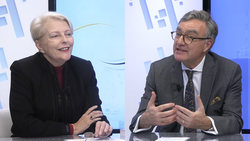
► Référence complète : J. Beyssade, "Compliance et gouvernance (exemple d'un groupe bancaire)", entretien mené par M.-A. Frison-Roche à l'occasion d'une série d'entretiens sur le Droit de la Compliance, in Fenêtres ouvertes sur la gestion, émission de J.-Ph. Denis, Xerfi Canal, enregistré le 12 décembre 2023, diffusé le 24 février 2024
____
🌐consulter sur LinkedIn la présentation de l'interview de Jacques Beyssade
____
🎥visionner l'interview complète sur Xerfi Canal
____
► Point de départ : En 2022, Jacques Beyssade écrit une contribution sur 📝La féminisation des postes à responsabilité dans les entreprises comme but de la compliance. Exemple du secteur bancaire, dans 📕Les Buts Monumentaux de la Compliance
🧱lire la présentation de cette contribution ➡️cliquer ICI
____
► Résumé de l'entretien :
Marie-Anne Frison-Roche. Question : Compliance et gouvernance, on fait souvent le lien. Pouvez-vous nous expliquer comment, dans la stratégie d’un groupe bancaire comme BPCE, s’articule ce lien entre compliance et gouvernance ?
Jacques Beyssade. Réponse. : La compliance n'est pas seulement l'obéissance aux règles mais aussi et peut-être plus encore le fait de respecter les clients, les fournisseurs, les parties prenantes, les sociétaires. Pour une structure mutualiste, clients et et sociétaires se rapprochent, c'est le même corps social, et c'est donc une affaire de gouvernance.
____
MaFR. Q. : Prenons un exemple concret, où la Compliance et la gouvernance servent un but spécifique : par exemple l’égalité effective entre les femmes et les hommes. Dans votre groupe, comment cela se passe ?
J.B. R. : Cet objectif est dans les gênes de la BPCE, notamment des caisses d'épargne. La loi Copé-Zimmermann le demande. Nous le faisons au-delà de cette contrainte, au niveau de la gouvernance. Le directoire, ou le comité de direction, est égalitaire et cela fonctionne aussi comme un exemple. La compliance prend le relais, par exemple en identifiant les talents, notamment les talents féminins et corrigeant les anomalies
____
MaFR. Q. : A l’avenir, peut-on espérer que cette alliance entre cette nouvelle gouvernance et la puissance de la Compliance, ayant les mêmes Buts Monumentaux, puisse transformer nos sociétés ?
J.B. R. : les évolutions de la société vient des comportements des individus et des sociétés, comme l'a montré l'ouverture des comptes d'épargne aux femmes au XIXième. Les deux peuvent faire beaucoup, dans le cadre des réglementations en dépassant celles-ci. Par la gouvernance, par exemple dans une banque mutualiste comme est la BPCE, ce sont les sociétaires qui fixent des règles, qui reflètent les mouvement sociaux parce qu'ils sont eux-mêmes représentatifs de la société toute entière. C'est ainsi qu'il peuvent agir en concrétisant, par l'alliance de la gouvernance et de la compliance, les mouvements sociaux de fond qu'ils représentent eux-mêmes par la large représentation du corps social que les sociétaires constituent.
________

19 février 2024
Publications

🌐suivre Marie-Anne Frison-Roche sur LinkedIn
🌐s'abonner à la Newsletter MAFR Regulation, Compliance, Law
____
 ► Référence complète : M.-A. Frison-Roche, Compliance et conformité : les distinguer pour les articuler, document de travail, février 2024.
► Référence complète : M.-A. Frison-Roche, Compliance et conformité : les distinguer pour les articuler, document de travail, février 2024.
____
📝 Ce document de travail a été élaboré pour servir de base à l'article paru dans la Chronique MAFR - Droit de la Compliance tenue au Recueil Dalloz
____
► Résumé du document de travail : On utilise parfois les mots "conformité" et "compliance" l'un pour l'autre, présentant la "conformité" comme la traduction en bon français juridique de la "compliance", qui viendrait du système américain. Cela n'est pas exact car chacun de ces termes renvoie à deux conceptions, qui sont distinctes, voire opposées.
En effet, la "conformité" obligerait les entreprises à donner à voir qu'elles obéissent activement à toutes les "réglementations" qui leur sont applicables, dans l'indifférence du contenu de celles-ci. Le Droit de la Compliance est une branche du droit substantielle qui tire sa normativité des "Buts Monumentaux" visés par les autorités politiques et publiques : ces buts monumentaux visent à ce qu'à l'avenir les systèmes ne s'effondrent pas (buts monumentaux négatifs), voire s'améliorent (buts monumentaux positifs). Les systèmes concernés sont les systèmes bancaires, financiers, énergétiques, sanitaires, de transport, numérique, climatique. Le champ du Droit de la Compliance est donc à la fois beaucoup plus limité et beaucoup plus ambitieux que la "conformité".
Distinguer les deux permet de remettre la conformité à sa place, c'est-à-dire celle d'un outil du Droit de la Compliance. En tant que tel, la conformité justifie le récolement d'informations et leur mise en corrélation, le système algorithmique jouant un rôle majeur pour ce faire. En revanche, le souci humain qui porte le Droit de la Compliance justifie que celui-ci mette au centre la formation, l'action du juriste d'entreprise, de l'avocat et du juge. Le système probatoire de la Compliance qui est en cours de construction repose sur des techniques probatoire ancrées d'une part dans cet outil qu'est la conformité et d'autre part dans cette culture de Compliance, qui peuvent s'articuler dès l'instant qu'on ne les confond plus.
____
🔓lire le document de travail ci-dessous⤵️

9 février 2024
Organisation de manifestations scientifiques
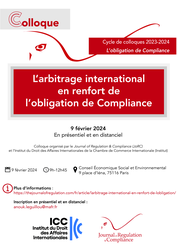
🌐suivre Marie-Anne Frison-Roche sur LinkedIn
🌐s'abonner à la Newsletter MAFR Regulation, Compliance, Law
____
► Référence complète : L. Aynès, M.-A. Frison-Roche, J.-B. Racine et E. Silva-Romero (dir.), L'arbitrage international en renfort de l'obligation de Compliance, Journal of Regulation & Compliance (JoRC) et Institut de Droit des affaires internationales de la Chambre de commerce internationale (Institut), Conseil Économique Social et Environnemental (CESE), Paris, 9 février 2024
____
____
🏗️Ce colloque s'inscrit dans le cycle de colloques organisé par le Journal of Regulation & Compliance (JoRC) et ses Universités partenaires, portant en 2023-2024 sur le thème général de L'Obligation de Compliance
____
📚Les travaux s'inséreront ensuite dans les ouvrages :
📕L'obligation de Compliance, à paraître dans la collection 📚Régulations & Compliance, coéditée par le Journal of Regulation & Compliance (JoRC) et Dalloz, publié en langue française
📘Compliance Obligation, à paraître dans la collection 📚Compliance & Regulation, coéditée par le Journal of Regulation & Compliance (JoRC) et Bruylant, publié en langue anglaise
____
► Présentation générale du colloque : "L'obligation de Compliance" peut paraître éloignée de l'arbitrage international si l'on ne conçoit le Droit de la Compliance qu'à travers les réglementations contraignantes, voire qu'à travers les Droits pénaux nationaux. L'arbitrage n'y aurait alors de points de contact que d'une façon répulsive, lorsqu'une personne prétend obtenir devant un tribunal arbitral exécution d'un contrat qui méconnait un but visé par la Compliance, par exemple la lutte contre la corruption ou le blanchiment d'argent, lesquels constituent des infractions. C'est donc sous un angle négatif que le croisement s'est fait.
Que l'arbitrage respecte la puissance du Droit pénal n'a rien de nouveau, ; que la puissance, notamment probatoire, de la Compliance, dans ses outils de détection et de prévention, l'y aide et engendre des difficultés d'articulation, c'est également acquis et discuté.
Mais l'obligation de Compliance vise des Buts Monumentaux, en matière de droits humains et d'environnement qui, notamment dans l'économie des chaînes de valeur, prennent la forme juridique de clauses de compliance, voire de contrats de compliance, ou d'engagements divers, dont les parties peuvent demander l'exécution à l'arbitre international. Elles le feront d'autant plus qu'il est souvent le seul juge international, voire global, disponible.
Le maniement qu'il fera alors du droit des obligations (contrat, quasi-contrat, responsabilité) vient en renfort de l'obligation de Compliance. L'arbitrage international trouve alors lui-même un nouvel espace de déploiement.
____
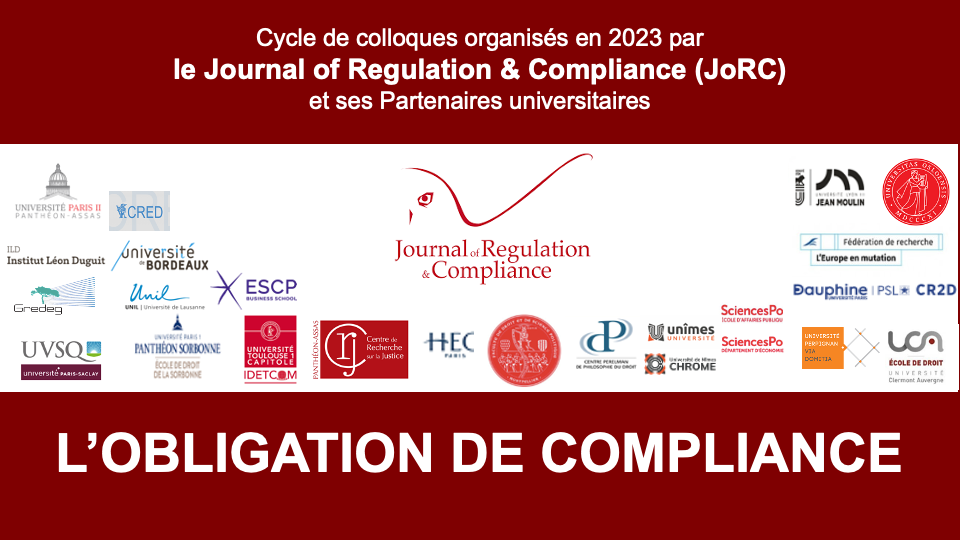
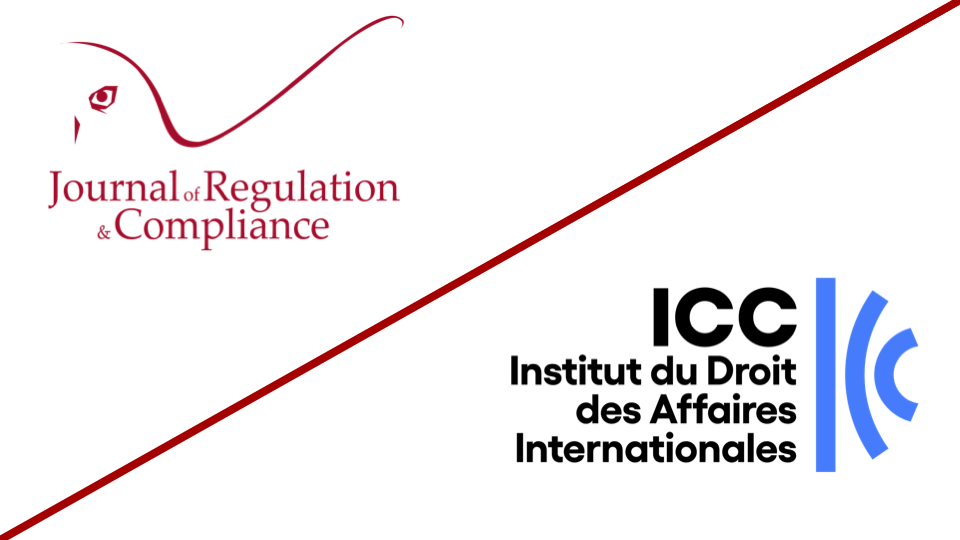
____
► Interviennent :
🎤Laurent Aynès, professeur émérite de Droit de l'Université Paris 1 Panthéon-Sorbonne, avocat à la Cour, Darrois Villey Maillot Brochier
🎤 Marie-Anne Frison-Roche, professeure de Droit de la Régulation et de la Compliance, directrice du Journal of Regulation & Compliance (JoRC)
🎤Jean-François Guillemin, ancien secrétaire général du groupe Bouygues
🎤 Christophe Lapp, avocat à la Cour, Advant Altana
🎤 Jean-Baptiste Racine, professeur de Droit à l'Université Paris Panthéon-Assas (Paris 2)
🎤 Eduardo Silva-Romero, président de l'Institut du Droit des Affaires Internationales de la CCI (Institut), avocat à la Cour, Wordstone
____
🧮Lire une présentation détaillée de la manifestation ci-dessous⤵️
9 février 2024
Conférences

🌐suivre Marie-Anne Frison-Roche sur LinkedIn
🌐s'abonner à la Newsletter MAFR Regulation, Compliance, Law
____
► Référence complète : M.-A. Frison-Roche, "Préalable : ce qu'est l'obligation de Compliance", in L. Aynès, M.-A. Frison-Roche, J.-B. Racine et E. Silva-Romero (dir.), L'arbitrage international en renfort de l'obligation de Compliance, Journal of Regulation & Compliance (JoRC) et Institut de Droit des affaires internationales de la Chambre de commerce internationale (Institut), Conseil Économique Social et Environnemental (CESE), Paris, 9 février 2024
____
🧮consulter le programme complet de cette manifestation
____
____
____
🔲consulter les slides servant de support à l'intervention
____
🎤consulter une présentation de la conférence "Préalable : ce qu'est un engagement", prononcée dans le même colloque
____
🎤consulter une présentation de la conférence "Le renforcement des engagements de compliance par le renvoi Ex Ante à l'arbitrage international", qui n'a finalement pas été prononcée mais donnera lieu à la rédaction d'un 📝article dans l'ouvrage à paraître sur 📕L'obligation de Compliance
____
► Présentation de la conférence : J'ai traité d'une façon préalable la définition même de l'Obligation de Compliance.
Après avoir montré que les rapports entre le Droit de la Compliance et l'Arbitrage international vont naturellement se développer, parce que les entreprises assujetties sont internationales, qu'elles contractualisent leurs obligations légales de Compliance et que la Compliance se juridictionnalise📎
Cette culture de compliance s'opère soit par des contrats de compliance📎
L'obligation de Compliance qui se concrétise alors consiste pour l'entreprise non pas à rendre effectives en Ex Ante toutes les réglementations qui lui sont applicables (conception de la conformité à la fois déraisonnable, aveugle et impossible), mais à faire ses meilleurs efforts, qu'elle doit donner à voir (cf. système probatoire de la Compliance📎
Ces Buts Monumentaux sont systémiques. Il s'agit de protéger les systèmes de l'effondrement (Buts Monumentaux Négatifs) ou de les rendre meilleurs (Buts Monumentaux Positifs)📎
L'office du juge, et donc aussi de l'arbitre, en sont renouvelés.
________
🕴️M.-A. Frison-Roche (dir.), 📕La juridictionnalisation de la Compliance, 2023.
🕴️M.-A. Frison-Roche, 📝Le juge, l'obligation de compliance et l'entreprise. Le système probatoire de la Compliance, in 🕴️M.-A. Frison-Roche (dir.), 📕La juridictionnalisation de la Compliance, 2023.
🕴️M.-A. Frison-Roche, 📝Les Buts Monumentaux, coeur battant du Droit de la Compliance, in 🕴️M.-A. Frison-Roche (dir.), 📕Les Buts Monumentaux de la Compliance, 2022.
1 février 2024
Conférences
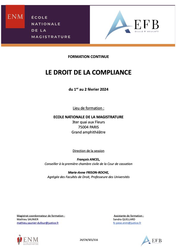
🌐suivre Marie-Anne Frison-Roche sur LinkedIn
🌐s'abonner à la Newsletter MAFR Regulation, Compliance, Law
____
► Référence complète : M.-A. Frison-Roche, "Droit de la compliance : tour d'horizon", in F. Ancel et M.-A. Frison-Roche (dir.), Droit de la compliance, École nationale de la magistrature (ENM) et École de Formation professionnelle des Barreaux du ressort de la cour d'appel de Paris (EFB), Paris, 1er février 2024
____
🧮consulter le programme complet de cette manifestation
____
____
____
🔲consulter les slides servant de support à l'intervention
____
🎤consulter une présentation de la conférence "Compliance et Responsabilité civile : comprendre et raison garder", prononcée dans le même colloque
____
► Présentation de la conférence : Le Droit de la compliance est mystérieux en soi, parce qu'il constitue une branche du Droit encore en formation📎
Parce que cette conférence a pour fonction d'introduire les deux journées d'un colloque conçu pour les magistrats et les avocats, elle se contente de faire ici un "tour d'horizon", afin que l'on puisse ne pas se perdre dans toutes ces réglementations changeantes, multiples et tentaculaires, des dispositifs à portée mondiale, des ambitions politiques qui imprègnent cette branche du Droit nouvelle.
C'est pourquoi, sans entrer dans aucun des sujets, il s'agit d'ouvrir 4 façons d'entrer dans ce qui constitue une branche du Droit en train de naître sous nos yeux :
1. Saisir le Droit de la Compliance par les "réglementations"
2. Saisir le Droit de la Compliance par les "outils"📎
3. Saisir le Droit de la Compliance par les "méthodes"
4. Saisir le Droit de la Compliance par les "buts"📎
Les 4 voies d'accès sont légitimes car les 4 dimensions s'articulent dans le droit positif.
Mais plus le Droit positif se consolide et plus c'est la normativité par les buts qui apparaît.
Cette normativité par les buts permet alors de distinguer le Droit de la Compliance du mécanisme de "conformité" aux réglementations, qui est un outil des systèmes de compliance, mais qui n'est que cela. Cette perspective téléologique donne aux règles la normativité, voire l'unicité et la simplicité sans laquelle l'ensemble n'est pas humainement maîtrisable. Les buts sont communs à tous les branches du Droit concernés (contrat, responsabilité, pénal, procédure, société, travail, environnement, international) et rend aussi la Compliance humaniste, la "conformité" n'étant que de l'obéissance.
Ces Buts sont monumentaux et l'Europe les porte plus et mieux que les autres zones du monde📎
________
🕴️M.-A. Frison-Roche, 📝Naissance d'une branche du Droit : le Droit de la Compliance, à paraître.
🕴️M.-A. Frison-Roche (dir.), 📕La juridictionnalisation de la Compliance, 2023.
🕴️M.-A. Frison-Roche (dir.), 📕Les outils de la Compliance, 2020.
🕴️M.-A. Frison-Roche (dir.), 📕Les Buts Monumentaux de la Compliance, 2022.
🕴️M.-A. Frison-Roche (dir.), 📕Pour une Europe de la Compliance, 2019.
12 décembre 2023
Conférences

► Référence complète : M.-A. Frison-Roche, enregistrement et animation d'une série d'entretiens sur le Droit de la Compliance, in J.-Ph. Denis, Fenêtres ouvertes sur la gestion, Xerfi Canal, tenus le 12 décembre 2023, diffusés en 2024.
____
► Présentation générale de la série, comprenant les entretiens successifs : 🧱Compliance - un sujet de choix pour nouer Droit et Gestion : La distinction des disciplines est justifiée, le droit d'une part, la gestion d'autre part : c'est maltraiter la réalité que, notamment, de dissoudre l'une dans l'autre (ce que Jankélévitch appelait "la réduction par déplacement d'une discipline") car chacune doit conserver son ancrage.
Ceci posé, parce que la réalité ne se construit suivant les disciplines, si l'on veut rendre compte de celle-ci, ou au moins en tenir compte, par exemple de la réalité des entreprises, il faut que les disciplines se croisent.
La compliance est un parfait terrain pour cela.
Merci à Jean-Philippe Denis, professeur de gestion, qui est depuis toujours ouvert à ce dialogue, de l'avoir concrétisé plus encore, en permettant une série d'interviews à la croisée du Droit et de la Gestion sur le média Xerfi Canal.
____
Dans un premier temps, 4 discussions ont été tenues entre Jean-Philippe Denis et moi-même sur les thèmes suivants :
- 🎬sur la nécessité pratique de faire converger l'analyse juridique et l'analyse de gestionnaire lorsqu'il s'agit de comprendre, maîtriser, promouvoir la compliance (diffusé le 23 septembre 2024) : cliquer ICI
- 🎬sur l'existence de différents systèmes de compliance selon les zones du mondes
- 🎬sur la "civilisation" de la Compliance
- 🎬sur le fait que la Vigilance est la pointe avancée de la Compliance (diffusé le 13 juin 2024) : cliquer ICI
Puis, dans un second temps
- 🎬avec 🕴️Jean-Baptiste Racine sur la manière dont l'arbitrage international est apte aujourd'hui à défendre les Buts Monumentaux de la Compliance, notamment les droits humains et les impératifs environnementaux.
- 🎬avec 🕴️Stanislas Pottier de la façon dont les entreprises intègrent cet impératif de compliance, notamment dans sa dimension environnementale, participent à la construction européenne par cette voie, et arrivent à faire connaissance avec ce personnage assez nouveau pour elle, au moins en France : le juge (diffusé le 27 avril 2024) : cliquer ICI
- 🎬 avec 🕴️Roch-Olivier Maistre du rôle que joue l'Arcom dans le nouveau système numérique qui se met en place, et quelle articulation se noue entre la Régulation et la Compliance, notamment pour mesurer en quoi la Compliance est un outil utile pour assurer une meilleure supervision des plateformes en ligne et lutter ainsi plus efficacement contre les phénomènes de manipulation de l’information et de haine en ligne (diffusé le 16 mars 2024) : cliquer ICI
- 🎬avec 🕴️Eduardo Silva-Romero de l'importance grandissante de l'arbitrage international pour les entreprises, arbitrage qui intègre les intérêts des États et répond aux impératifs de Compliance (diffusé le 27 avril 2024) : cliquer ICI
- 🎬avec 🕴️Christophe Lapp de la nécessité pratique de ne pas confondre la Compliance avec la simple conformité, notamment lorsque le juge est saisi, les Buts Monumentaux étant intégrés dans son raisonnement (diffusé le 3 février 2024) : cliquer ICI
- 🎬avec 🕴️Jacques Beyssade du rapport entre la gouvernance et la Compliance, illustré dans une banque mutualiste et plus particulièrement dans le recrutement et la promotion des femmes à des postes de responsabilité (diffusé le 24 février 2024) : cliquer ICI
____
____
🔓consulter ci-dessous une présentation de chaque interview mené avec un expert en Droit sur un sujet particulier de Droit de la Compliance⤵️
17 novembre 2023
Publications
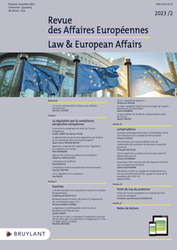
🌐suivre Marie-Anne Frison-Roche sur LinkedIn
🌐s'abonner à la Newsletter MAFR Regulation, Compliance, Law
____
► Référence complète : M.-A. Frison-Roche, "Le déploiement du droit de la régulation par le droit de la compliance dans un projet européen", in G. Hardy et F. Picod, La régulation par la compliance, perspective européenne, Revue des Affaires Européennes (R.A.E.), 2023/2, pp. 345-352.
____
🚧lire le document de travail bilingue sur la base duquel cet article a été élaboré, doté de développements supplémentaires, de références techniques et de liens hypertextes
► Résumé de l'article : Le Droit de la Compliance n’est ni une méthode d’obéissance aux réglementations, ni une simple méthode neutre d’efficacité des normes, ni une voie d’exécution déplacée de l’Ex Post vers l’Ex Ante. Il est le prolongement du Droit de la Régulation et va au-delà de celui-ci. Comme lui, il porte l’ambition de construire des espaces selon un projet politique propre à une zone, par exemple l’Europe. Droit tourné vers l’avenir, il construit et maintient d’une façon systémique des équilibres durables, bien qu’instables, pour atteindre des des « buts monumentaux » dans lesquels réside sa normativité : sécurité, durabilité, probité, vérité, dignité. En internalisant ces Buts Monumentaux dans les entreprises en position de les atteindre, les « entreprises cruciales, le Droit de la Compliance conserve la logique de régulation, lui offrant un essor prodigieux puisqu’il la libère de la condition d’un secteur et des frontières territoriales, qui paraissaient tautologique, en associant puissances privées et volonté publique, laquelle demeurant première. La Compliance peut ainsi réguler le numérique et le climatique, dans des choix politiques portés par une Europe souveraine.
________
6 octobre 2023
Conférences

♾️suivre Marie-Anne Frison-Roche sur LinkedIn
♾️s'abonner à la Newsletter MAFR Regulation, Compliance, Law
____
► Référence complète : M.-A. Frison-Roche, "La rencontre des MARD/PRD avec les Buts Monumentaux de la Compliance", in A. Albarian, S. Brunengo, D. Labrèche et N. Vermeys (dir.), Regards croisés France/Québec: l'essor et l'adaptation des PRD/MARD dans un contexte de crise, Aix-Marseille Université, 6 et 7 octobre 2023.
____
🧮consulter le programme complet de cette manifestation
________
4 octobre 2023
Conférences

🌐suivre Marie-Anne Frison-Roche sur LinkedIn
🌐s'abonner à la Newsletter MAFR Regulation, Compliance, Law
____
 ► Référence complète : M.-A. Frison-Roche, "L'avenir du Droit de la compliance, in Cour de cassation, La Nuit du Droit 2023, 4 octobre 2023.
► Référence complète : M.-A. Frison-Roche, "L'avenir du Droit de la compliance, in Cour de cassation, La Nuit du Droit 2023, 4 octobre 2023.
____
____
🧮lire le programme complet de la manifestation
La Cour de cassation construit une présentation de 4 thèmes successifs en ce qu'ils engagent l'avenir du Droit : la filiation, l'intelligence artificielle, l'environnement et la compliance.
La présentation de ce qu'est la Compliance et le rôle essentiel qu'y joue le Juge est faite par le Président de la Chambre sociale de la Cour de cassation. Puis le Parquet général interroge Monsieur le Conseiller d'État Fabien Raynaud sur l'importance des "causes systémiques" dans le Droit de la compliance et le dialogue des juges que cela implique, prenant appui sur le cas Youporn, actuellement examiné par les juges.
____
► Présentation générale de l'intervention : En tant que mes travaux ont été fondateurs pour le Droit de la Compliance, j'ai été pour ma part interrogée sur l'avenir du Droit de la Compliance, auxquels s'était référé Fabien Raynaud à propos du traitement juridictionnel des sujets environnementaux, lorsqu'ils présentent une dimension systémique.
J'ai repris à la fois la définition même du Droit de la Compliance, qu'il ne faut confondre avec la simple, mécanique, voire dangereuse "conformité", et le grand avenir de cette branche du Droit que nous voyons naître sous nos yeux, ce qui est tout à fait extraordinaire ! L'environnement en est un exemple, mais tout l'espace numérique peut trouver une façon d'être régulé par le Droit de la Compliance notamment parce que le Droit de la Compliance porte sur l'Information, se déployant comme prolongement du Droit de la Régulation, comme le mécanisme de la Vigilance qui porte sur la structuration des chaînes de valeur. Il implique une alliance, entre les entreprises cruciales, les parties prenantes, l'Etat, et le juge.
Dans ce mouvement extraordinairement puissant qu'est le Droit de la Compliance, le Juge est et sera au centre.
________
28 septembre 2023
Conférences

♾️suivre Marie-Anne Frison-Roche sur LinkedIn
♾️s'abonner à la Newsletter MAFR Regulation, Compliance, Law
____
► Référence complète : M.-A. Frison-Roche, "Conclusion", in Club des avocats environnementalistes, L’eau : entre protection de la ressource et conflits d’usage, Maison des Avocats, Auditorium, 28 septembre 2023.
____
🧮consulter le programme complet de cette manifestation
________